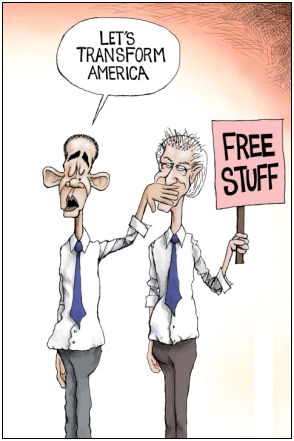By Natalia Castro
In 1996, President Clinton did something right in the field of welfare reform. With bipartisan support, changes made government assistance a true transition into the working world and required able bodied adults applying for welfare to prove they were actively job seeking. In 2012, President Obama removed this mandate, and now our labor force is suffering.
Clinton’s welfare reform law placed restrictions on long term welfare recipients in order to transition the program to one which reduces dependency. Not only did these reforms require individual families to seek employment to receive benefits but as The Atlantic of Aug. 2012 explains, “states have to show that 50 percent of welfare-receiving families — and 90 percent of two-parent families — are involved in work activities. What constitutes ‘work activities’ is not necessarily a job; training, job-search assistance, volunteer work, vocational and skills training, and some forms of education and child-care work are included.”
The law also set up gradual work requirement increases to continue reducing the dependency factor associated with government benefits and assist families transitioning into the workplace.
Similar programs worked, as proven in key states such as Maine, where within a year of implementation food stamps recipients dropped by nearly 5,000 and employment rose. As Josh Archambault explained on Forbes.com in May 2016 explained, “Today, just 1,500 able-bodied childless adults rely on Maine’s food stamps program. Those still relying on the program also need less assistance overall, as they are working more, with average benefits dropping 13 percent since the work requirements went into effect. As a result of these changes, taxpayers are now saving between $30 million and $40 million each year.”
But this was not as a result of Clinton’s welfare reform program, this was individually implemented by Maine’s governor. Despite Clinton making it a mandate for welfare recipients to work, Obama removed this provision by executive order in his first term.
Senate Finance Committee Chairman Orrin Hatch (R-Utah) fought Obama on this in 2013, arguing “The Obama Administration has an unfortunate track record of circumventing Congress and governing by Executive fiat instead…We are reminded of its unilateral decision to attempt to gut welfare work requirements, undermining the work-first approach that served as the foundation to the landmark 1996 bipartisan welfare reform law.”
President Obama took what was bipartisan, and made it partisan. Now over 20 years after Clinton made working for welfare law, we are experiencing the ramifications of this provisions absence.
With our current labor participation rates diving, there needs to be more incentive to look for work for those who are on government assistance. Even as labor force participation declines, food stamps usage has continued to rise due to President Obama’s acceptance of unemployed welfare recipients.
Work for welfare programs encourage able bodied adults to seek employment. Without it, there is a powerful incentive not work, and now American labor force participation has dipped to the lowest numbers since 1970. As the LA Times’ Jim Puzzanghera explained in Nov. 2016 a labor force participation rate just over 60 percent proves our economy is unable to maximize its use of human resources, inevitably causing our economy to be underperforming. Simply put, when Americans don’t work, our economy cannot work.
Robert Doar of the Wall Street Journal continues to note that, “Running New York City’s welfare program for six years in the Bloomberg administration until 2013 taught me that employment is central to the well-being of families and the economy. The fact that so few Americans are holding or actively seeking a job is a serious problem, especially for those at the bottom.”
Without an incentive to work, the most in need Americans are simply not doing it and our entire labor force is suffering. The original bipartisan legislation on welfare reform was meant to make the system a stepping stone for Americans, but President Obama removed the programs transitional nature.
Now the American economy is suffering and will continue to unless more states, and hopefully President-elect Donald Trump will support initiatives such as Maine’s; requiring welfare recipients to work for their benefits and returning the labor force to efficiency.
Natalia Castro is a contributing editor at Americans for Limited Government.







